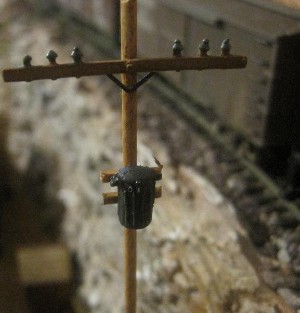|
HOME
Cedar Shingles
Figures
Forest Turf
Logcar Kits
Model Fences
Natural Stumps
Plating Service
Power Lines
Sawmill Wood
Scale Glass
Sound Cams
Weathering
Shipping
Product List
Craftsman Cars
RR Gallery
RR Articles
RR Links |
 Power and telegraph poles crossed the
country with the railroad. Companies like Western Union had their own cars and
crews working from coast to coast. Our products can help simulate this
important detail on your railroad.
Power and telegraph poles crossed the
country with the railroad. Companies like Western Union had their own cars and
crews working from coast to coast. Our products can help simulate this
important detail on your railroad.
The Power/Telegraph Pole kit provides 24 poles that are long enough to "plant"
in your scenery at any height. Cross arms and wire braces are
included for the poles.
Electrical pole wire insulators, fuzz-free power lines,
small diameter hardwood doweling, and
lightning rod kits with glass balls and grounding cable
are also available.
|
|
|
Power/Telegraph Pole Kit=$17.95.
Kit includes 24 hardwood poles that are 8 scale inches in diameter (HO) and 41 feet long, 24 cast metal crossarms with 6 cast insulators each, 2 cast metal transformers and mounting wood, brace wire, a roll of our Fuzz-Free power lines, and instructions. This is our "new and improved" kit for simulation of electrical distribution to your structures or telephone/telegraph lines for communication.
|
|
|
Hardwood Doweling=$6.99.
Small diameter wood doweling is very hard to make. We offer light colored
hardwood doweling that is 1/16 diameter by 6 inches long in a package of 50.
Use as telegraph/power poles or limitless other scenery items.
|
|
|
Electrical Pole Wire Insulators=$4.95.
These glass beads can represent the glass insulators on
telegraph/power poles. Approximate size: Diameter = .050; Height =
.030. State desired color -- White, Green,
Blue, Black, or Clear.
|
|
|
Fuzz-free Power Lines=$4.95.
Includes 450 feet of monofilament line (Diameter=.005 inches). The
line is used as power lines by attaching it to pole insulators. Full
instructions on how to properly sting power lines are included.
|
|
|
Lightning Rod Kit=$4.95.
Includes enough materials
to make 10 lightning rods with glass balls and ground cable. Full instructions
included. |
Lightning Rods -- Since the 1800's, most of our country's
buildings have been protected by lightning rods. The early structures
were made of wood and fire was a real danger. The Franklin Lightning Rod
Company provided protection from
lightning hits with lightning rods and indicators for over 100 years.
During my childhood, my Grandfather, who owned a large farm, had a huge wooden barn with lightning rods and glass balls on top of the roof. Those were the lightning strike protection and indicators. If lightning were to hit a rod, the rod would heat up and the glass balls, which were set on the rod, would shatter. With that a farmer, or anyone using such a system, would know to check the lightning rod protection system. These lightning rods would carry the electrical energy from the strike from the affected rod to the ground via a copper cable that was attached to each rod and down to a grounding rod. You can simulate these lightning rods with the Sierra Scale Models Lightning Rod Kit by mounting several rods on the highest points of your buildings (no more than 12 feet apart) and running our copper colored grounding cable between them, down the side of your structure, terminating into the ground. This is a very visual detail. The hand-blown glass colored balls were several different colors, including clear, blue, green, and red. Historical facts can be learned on Google or by going to the Franklin Lightning Rod company Internet site.
. |
|
|